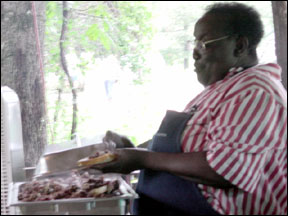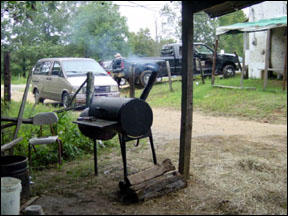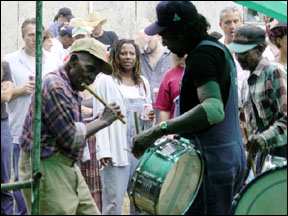|

In one horrific span of a few hours, the morning of Tuesday, September 11, pride of
country washed over us, communally, for the first time in decades. The brave
firemen at Ground Zero in New York cut Iwa Jima figures as they planted a flag in the
rubble. The stars and stripes are hanging from doorsteps, flapping from car antennaes.
Even us hippies who marched against the Vietnam War are now wearing
American flag pins on our lapels.
In keeping with this reawakening of national pride, we decided to travel to a distinctly
American event. And in keeping with the closeness a lot of us are feeling these days, it's
an event that is built on the spirit of dropping our differences. Reporter Benjamin Adair
takes us to a grand old picnic in Mississippi where the roots of the music and the people
and the pie can be traced back hundreds of years. In the Northern hill country of the state,
Ben met up with 94-year-old Otha Turner, who is the last living link to two distinctly
American traditions. The first is "Fife and Drum" music, descended from early American
military music. The second is the Great Picnic - a celebration of sharecroppers in days
gone by. Today, Otha Turner's is said to be the last picnic in Mississippi.
The Picnic
9/21/2001
I could tell you how
to get there, but that would only help. I could tell you you fly into
a town where they say the blues is in trouble (where they say all
the younger set are going so heavily for the hip hop and it's hard,
they say, to get people to support basic blues). You get in a car
and you drive south. You go from a big road...to a little road, to
an even smaller road...and just when you're about to give yourself
up for lost, when you're looking around like you're in another country.
You're there.
Only you're not, because I can give you direction, and you'll
arrive at Otha Turner's picnic - the last of the great picnics -
but...that's really only half of what you need.
Here. Let me show you what I mean.

Betty Serves BBQ...
You drive these roads and you get there early. You find Otha Turner's
farm - see his house which is not a trailer like the ones next door,
but a house that stands in front of a pig pen and a caged, wailing
hound dog and the spot where they'll kill, skin, and barbeque two
goats in the morning. Behind the house there's an older white man
- he used to be Mississippi highway patrolman, he tells you, and
this is his first picnic, too. He's just gotten there. Just backed
his huge Ford F250 into Otha's yard and unloaded the pipes, the
tarps, the rope to make a tent. No rain, Mr. Otha says, NO RAIN
is going to EVER going to cancel a picnic.
So you stand in the drizzle and you help assemble this tent. And
you try not to think about this state trooper, this good Samaritan,
this man, this white lawman, who may or may not have fought in America's
second civil war, who may or may not still be fighting. This man,
this generous man, who will tell you in just a few hours to, look
at that woman over there. When the light hits her just right and
you get her in just right profile, doesn't she look exactly like
Whoopie Goldberg?
No. Put that out of your mind. Move out from under the tent toward
this other man, this black man with short white hair and a blue
mesh cap - overalls and a flannel. He's walking toward the overhang
and he swaggers. He moves with the strength and confidence of a
man who's worked the land hard his whole lives. He's shaven, though
how he works the razor between those deep lines in his face is a
mystery. He's got silver-blue eyes and...when the light hits them
just right, and he's staring straight at you, they reflect. They
stare right through you.

Picnic preparations on Otha Turner's
farm.
In a few seconds, he'll start telling you a story...and you'll
start to believe...Everything you've heard about Otha Turner is
true. Otha Turner - the last of the fife players; Otha Turner: former
share cropper; America's last living link to a culture that - like
him at 94 years old - simply and stubbornly - refuses to die.
Otha Turner: "...and I said, Mr. Arie. What's that
you blowing? He said, it's a fife. I said, I thought a fife was
a dog, he said, no it aint. This is fife I'm blowing. I said, will
you make me one of them? He said, I don't know...do like your momma
told you and I'll make you one."
And then, about 17 seconds into this astounding story about how Otha
Turner, living legend, first picked up an instrument, first learned
how to play a fife - you realize you don't understand a single word
he's saying.
Bill Ramsey: "Fwew. Actually my first memory of
the picnic is when I was a little bitty boy, visiting my grandma
who lived down here, she took us to the see the picnic, but we stood
up on a hill looking down and we watched Napoleon play and Otha
Turner play. The picnic was large but totally black at that time.
This was the late 50s, early 60s...I was a real little boy then."
Robert Reed, Jr.: "First picnic? Oh man, you weren't
even born then. You weren't even born then."
Bernice Turner: "I'm Bernice Turner, Otha Turner's
daughter. (What's your first memory of the picnic?) I was about
8 years old. (What do you remember about it?) The fife and drums.
The music. That's mostly when you're young, that's what catches
your eyes. (You were eight years old running around?) I wasn't running
around. I was standing in the back of my daddy's pick up truck.
We would get out and go get us a snowball or something like that
and then go back to the truck."
Otha: "Well, that's the pleasure. That's pleasure.
Folks work hard during the weeks and ain't got no where to go for
their enjoyment, see? All right. When they found out, I used to
give nights of them. At night, they played in the house, burning
the lamp. Wasn't no electric light. And the people would come down
and they'd like that. They'd see that."
Bill: "(So it was all black and whites looked down
from up around?) Mostly. A few mixing in but you know, we were young
and this was the 50s. We were taken to watch and listen to this
usual music. Nobody then heard much like it in the white community..."
David Katznelson: "Well, you see, what's the first
image you have of American music? Military music is the first music
we brought over here. You have the fife and drum player with the
little piece of string wrapped around his bleeding head, marching
down the battle grounds. What I've heard is that slaves picked up
on this military music. It's music that their owners would allow
them to play and what they did was make it better and more soulful
and make it a brand new thing."
Bill: "According to Alan Lomax, it was a strong
musical reference that this type of music is very similar to in
Senegal, where people make fifes out of bamboo. And what happened,
a lot of the slaves who came to this area were from that part of
Senegal in Africa. Number one. Number two, the slave owners and
the slaves developed a strong bond in this part of Mississippi and
were almost never sold. So you had people going all the way back
to Ed and Lonnie Young and Jessie Mae Hemphill who lived here and
played that music. And later Napoleon and Otha Turner and it stuck
because you that strong tradition and strong community here."
Robert: "I believe it was in 1947. We lived in
the Delta part of Mississippi, and my uncle came down and he played
and some more people came and played drums, the Hemphills. Yes,
sir. Sid Hemphill and them. Uh, Freddy Brooks and his brothers.
They had a good band. They all died out. there used to be a lot
people in here that played old music like that. Sure did."
Otha Turner and his Rising Star Fife and Drum band have two records.
David Katznelson's the label exec. He says the music will get to
you like it got to him. He says the music, "it's transcendent and
when you first hear it, it sounds great and the second time you
hear it, it sounds great..."
David: "...but then suddenly you get this need
to hear it and then all of a sudden you hear the drums come in and
it's like, aw man! And then it suddenly opens up this very weird
musical world. This is a great place, it transcends reality and
I'm sure it's what they've been doing since the very beginning."
Back in sharecropping days, the picnics were held during the lay-by...That's
after you've done all your planting and sowing and cultivating...when
you just have to wait for the cotton or the corn to grow. So, nothing
else to do - why not have a party? Why not invite everybody, from
everywhere? Why not bang on that big bass drum which, in the days
before all this noise we're so used to now, you could hear for miles.

Otha Turner on the Fife...
Otha Turner says the picnics were competitive. You'd throw one
and then I'd throw one and mine better be better than yours. These
days, however, Otha Turner takes first prize every time. Because
just like he's got the last Fife and Drum band, he also has the
last picnic.
Bernice: "...at that time there were others, but
this is the only one left because most of the other people done
died out. Or are in homes. Or are disabled. So dad is the only one
that still does it."
The picnics are bigger now. There are more musicians - it's not just
fife and drum music, but North Mississippi blues. And more "guests,"
more "visitors," more tourists come too.
The purists will tell you that it's getting too big - that the
200 people crammed in behind Otha Turner's house and the pig pen
- about half from out of town - those are mostly white - and the
rest from round the area - mostly black...the so-called purists
will tell you that it's getting diluted. But, like the college girl
who threatened to trip me if I didn't have Otha's permission to
record, most of the so-called purists are at their first, second
or third picnic themselves. And, more than that: most of these complainers
aren't even dancing.
Bernice: "(What are your favorite parts of the
picnic?). Um, gosh. You only get goat once a year. And to see some
of the same faces that come back year after year. Like Bill and
I have grown real close and I've met friends and it's kind of like
a reunion thing because you get people who want to come and it really
touches my heart. A lot of them will tell me how much they enjoyed
it and it really, it touches you to let you know that you touched
somebody else's life."
Carter Little: "Basically the vibe is music and
camaraderie and food and people from very different walks of life
getting together to support Otha Turner and what he's doing and
what he continues to do..."
David: "And you know everyday is an amazing thing.
You see Richard Johnston setting up over there and he's a great
player, luther is coming down later. Last year it was RL Burnside
and T-Model Ford. It's amazing, one thing I'll point out, this guy
from the New York Times wrote a couple of months ago about how the
blues was dying in this part of the world, when, in fact there's
players galore and all you have to do is come to the picnic."
Otha: "Go for the enjoyment. A picnic is like a
family reunion. If you're having all the fun you want there ain't
nothing else. You ain't got to worry about nothing else."
What you realize after spending a couple hours at Otha Turner's Picnic,
as I recommend everyone do...after you've eaten some barbeque goat
or pork sandwiches and talked with Jim and seen how everyone picks
on Chip, but how that's okay because once Chip starts singing...after
you've drunk a few beers and maybe some of that Mississippi moonshine...after
you've let go of your notions of who belongs and who doesn't and you
even see that state trooper dancing there with his son (whom he's
fetched from home so as not to miss this)...after a couple hours,
two things happen.
First, you start to understand Otha...so you know what he means
when he says, "Something that you can do that the people like it.
I think it's low down aggravating you don't do it..."
Otha: "...See that's the way I see that. Just like
you want me to blow that cane, and you know I can blow and I sit
there and look at you and wouldn't do it. That's low down. So that's
the way I is."
Second. You figure out that here, in the middle of nowhere Mississippi,
the sons and daughters of those sons and daughters of former slaves
and slave owners have a way that someone from the outside - anyone
like you - understands. Here, there's a rhythm to life and pleasure,
and as Otha Turner himself puts it, to the enjoyment, that seeps in,
underneath. That gets to you. And the first time you feel it, you
think it's great. The second time you feel it, you think it's great.
And what you get by going to Otha Turner's picnic is that third time,
when the drums come in...it's like...oh man.
Somewhere near Senatobia, Mississippi, on the edge of the hill
country, I'm Benjamin Adair for the Savvy Traveler.
Return to Feature Archive
|







